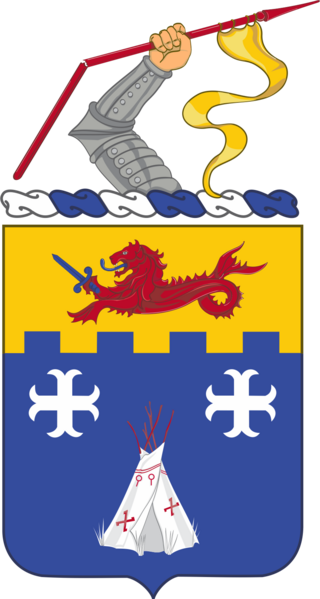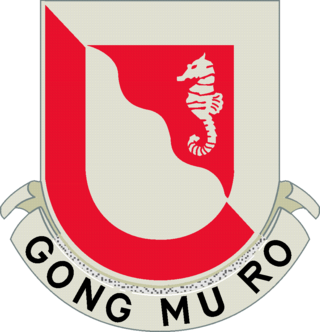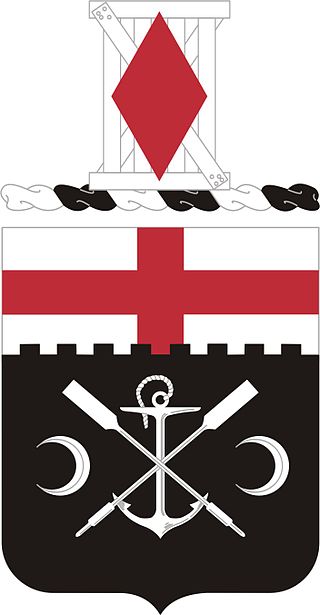
The 3rd Battalion, 16th Field Artillery Regiment is a field artillery battalion assigned to the 2nd Brigade Combat Team, 4th Infantry Division. Carrying the lineage of Battery C, 16th Field Artillery Regiment, the battalion carries campaign streamers from World War I, World War II, and Vietnam, and has served with the 4th Infantry Division and 8th Infantry Division. The unit's nickname is "Rolling Thunder", and their motto is "Macte Nova Virtute". The battalion is composed of a headquarters and headquarters battery (HHB), three cannon batteries, and has an attached Forward Support Company, Company F, 15th Brigade Support Battalion.

The 1st Armored Brigade Combat Team, 1st Cavalry Division is a cavalry unit of the United States Army based in Fort Cavazos, Texas.

The 9th Infantry Regiment ("Manchu") is a parent infantry regiment of the United States Army.

The 39th Infantry Regiment is a parent regiment in the United States Army. Originally organized for service in World War I, the 39th fought in most of the conflicts involving the United States during the 20th century, and since 1990 the 2nd Battalion has served as a training unit stationed at Fort Jackson, South Carolina. The 3rd Battalion was started on 21 October 2015 and a 4th Battalion was added in July 2017.

The 12th Infantry Regiment is a unit of the United States Army. The 12th Infantry has fought in seven wars from the Civil War to the Global War on Terrorism and has been awarded 19 Presidential Unit Citations, five Valorous Unit Awards, a Joint Meritorious Unit Award, two citations in the Order of the Day of the Belgian Army, Nine Republic of Vietnam Crosses of Gallantry, the Republic of Vietnam Civil Action Honor Medal Third Class, a Meritorious Unit Commendation, and the Belgian Fourragere.

The 14th Infantry Regiment is a United States Army light infantry regiment. It has served in the American Civil War, Boxer Rebellion, World War II, Korean War, Vietnam War, Operation Restore Hope, Operation Uphold Democracy, Operation Joint Guard, Operation Desert Storm, Operation Enduring Freedom, Operation Gothic Serpent, Operation New Dawn, Operation Resolute Support,Operation Iraqi Freedom, and Operation Inherent Resolve. The 14th Infantry Regiment did not take part in combat during World War I. It has also conducted peacekeeping and humanitarian missions in the Sinai Peninsula, Guantánamo Bay in Cuba, Bosnia, and Kosovo.

The U.S. 60th Infantry Regiment is a regimental unit in the United States Army. Its 2nd and 3rd Battalion conduct Basic Combat Training.

The mission of the 204th Brigade Support Battalion, "Rough Riders," is to, on order, deploy and execute responsive Combat Service Support and Combat Health Support in support of the 2nd Brigade Combat Team, 4th Infantry Division's objectives. was originally constituted as the 5th Sanitary Trains on 10 November 1917 at Camp Logan, Texas. During World War I, the unit fought in numerous battles and campaigns including the Battle of Saint-Mihiel, Meuse-Argonne Offensive, and the Battle of Champagne, at Lorraine. After the First World War, the unit was reorganized and re-designated on 29 January 1921 as the 5th Medical Regiment. The 5th Medical Regiment was inactivated in August 1921 at Camp Jackson, South Carolina.

The 27th Engineer Battalion(Combat) (Airborne)"Tiger Battalion" is an engineer battalion of the United States Army.

The 4th Engineer Battalion is an engineer battalion of the United States Army. It is made up of combat engineers. The unit saw action in the American Civil War, World War I, World War II, Vietnam War, and the Global War on Terrorism, to include Operation Iraqi Freedom and Operation Enduring Freedom.

The 37th Engineer Battalion is an airborne engineer battalion in the United States Army, and currently subordinate to the 2d Brigade Combat Team, 82d Airborne Division, based at Fort Bragg, North Carolina. The 37th Engineer Battalion was reactivated in the 82d Airborne Division as part of the United States Army new BCT 2020 concept in which each BCT's Special Troops Battalions would be inactivated and reactivated as Brigade Engineer Battalions. Prior to this, the battalion was a subordinate unit of the 20th Engineer Brigade assigned to XVIII Airborne Corps.

The 864th Engineer Battalion is a combat engineer battalion of the United States Army based at Joint Base Lewis-McChord, Washington. The battalion is a subordinate unit of 555th Engineer Brigade.

The 1st Battalion, 21st Field Artillery was a field artillery battalion of the United States Army based in Fort Hood, Texas. It was a subordinate unit of the 41st Fires Brigade.

The 14th Brigade Engineer Battalion is a Combat Engineer Battalion of the United States Army based at Joint Base Lewis-McChord, Washington. The battalion is a subordinate unit of the 2nd Stryker Brigade, 2nd Infantry Division, and I Corps. The battalion's official motto is "Gong Mu Ro" and battle cry "Rugged!".

The 6th Field Artillery Regiment is a Field Artillery Branch regiment of the United States Army first activated in 1907 from numbered companies of artillery. It was first organized with two battalions.

The 15th Field Artillery Regiment (FAR) is a field artillery regiment of the United States Army first formed in 1916. A parent regiment under the U.S. Army Regimental System, the 15th FAR currently has two active battalions: the 1st Battalion, 15th Field Artillery Regiment, is assigned to the 1st Brigade Combat Team, 2nd Infantry Division, while the 2nd Battalion, 15th Field Artillery Regiment, is assigned to the 2nd Brigade Combat Team, 10th Mountain Division.

The 32nd Field Artillery Regiment is a distinguished and highly decorated field artillery regiment of the United States Army, first Constituted in 1918.

The 58th Infantry Regiment is a regiment of the United States Army first established in 1917.

The 7th Engineer Battalion is a unit of the United States Army located at Fort Drum, New York. This battalion falls under the 10th Mountain Division's 1st Brigade Combat Team. The battalion has the Brigade Combat Team's engineer companies, military intelligence company, and signal company.

The 2nd Battalion, 320th Field Artillery Regiment is an inactive field artillery battalion of the United States Army. The battalion has been assigned to the 82nd Airborne Division, 11th Airborne Division and 101st Airborne Division. The battalion has participated in World War I, World War II, Vietnam, Operation Desert Storm, Operation Iraqi Freedom, and Operation Enduring Freedom. The battalion deactivated in July 2015 as part of ongoing force reductions, and its personnel and equipment were reflagged as the 2nd Battalion, 32nd Field Artillery Regiment.






















